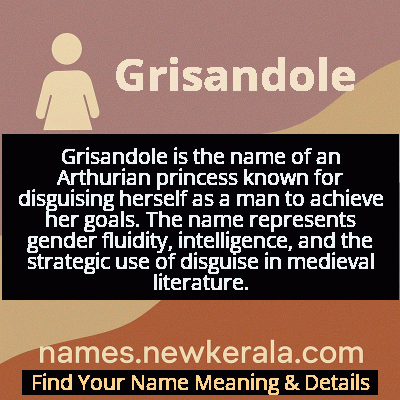Grisandole Name Meaning & Details
Origin, Popularity, Numerology Analysis & Name Meaning of Grisandole
Discover the origin, meaning, and cultural significance of the name GRISANDOLE. Delve into its historical roots and explore the lasting impact it has had on communities and traditions.
Name
Grisandole
Gender
Female
Origin
Arthurian
Lucky Number
5
Meaning of the Name - Grisandole
Grisandole is the name of an Arthurian princess known for disguising herself as a man to achieve her goals. The name represents gender fluidity, intelligence, and the strategic use of disguise in medieval literature.
Grisandole - Complete Numerology Analysis
Your Numerology Number
Based on Pythagorean Numerology System
Ruling Planet
Mercury
Positive Nature
Adventurous, dynamic, curious, and social.
Negative Traits
Restless, impatient, inconsistent, prone to indulgence.
Lucky Colours
Green, white.
Lucky Days
Wednesday.
Lucky Stones
Emerald.
Harmony Numbers
1, 3, 9.
Best Suited Professions
Sales, marketing, travel, entertainment.
What People Like About You
Versatility, charisma, adventurous spirit.
Famous People Named Grisandole
Grisandole
Arthurian Princess/Knight
Disguised herself as a male knight to serve Emperor Lucius and solve prophetic dreams
Grisandole (Literary Character)
Literary Figure
Featured in the Post-Vulgate Cycle as a cross-dressing noblewoman who demonstrates exceptional wisdom
Grisandole (Arthurian Tradition)
Mythological Figure
One of the earliest examples of gender-crossing in medieval literature, challenging traditional gender roles
Name Variations & International Equivalents
Click on blue names to explore their detailed meanings. Gray names with will be available soon.
Cultural & Historical Significance
Historically, Grisandole's narrative reflects the complex attitudes toward gender in medieval society, where women's agency was often limited but could be exercised through unconventional means. Her story demonstrates how intelligence and capability could transcend gender boundaries, even in a patriarchal framework. The character's ability to solve prophetic dreams that baffled male advisors further emphasizes the theme of hidden feminine wisdom prevailing where masculine logic fails. This makes Grisandole not just a literary curiosity but a symbol of subversive female power within the Arthurian canon.
Extended Personality Analysis
Grisandole embodies a complex blend of traditionally masculine and feminine traits that create a unique psychological profile. She demonstrates remarkable courage and strategic thinking, willingly adopting a male identity to navigate a world dominated by men. Her intelligence shines through her ability to interpret complex prophetic dreams that confound other characters, showing exceptional analytical skills and intuition. At the same time, she maintains her essential feminine qualities of compassion and emotional depth, creating a well-rounded character who transcends simple gender binaries.
Her personality is characterized by resilience and adaptability, able to seamlessly transition between gender roles as circumstances demand. Grisandole shows tremendous patience and determination, maintaining her disguise for extended periods while pursuing her goals. She possesses a strong sense of justice and loyalty, serving her emperor faithfully even while concealing her true identity. This combination of traits makes her a psychologically complex figure who represents the medieval understanding that human character contains multitudes beyond superficial gender distinctions. Her story suggests that true strength comes from integrating diverse qualities rather than conforming to rigid gender expectations.
Modern Usage & Popularity
In contemporary times, Grisandole remains an extremely rare name, primarily used by Arthurian enthusiasts, scholars, and parents seeking unique mythological names with feminist significance. The name has seen minimal usage in birth records, making it exceptionally distinctive. However, it has gained some recognition in academic circles and among fantasy literature fans who appreciate its historical significance as an early example of gender nonconformity in Western literature. The character's story resonates with modern discussions about gender identity and fluidity, giving the name renewed relevance in the 21st century despite its obscurity. While not appearing in popular baby name databases, it occasionally surfaces in specialized naming communities focused on literary and mythological names.
Symbolic & Spiritual Meanings
Grisandole symbolizes the fluidity of identity and the power of transformation. Her cross-dressing represents the medieval concept of 'engin' or cleverness—the ability to use wit and disguise to overcome social limitations. The name carries connotations of hidden wisdom, as Grisandole's true capabilities are revealed only when she sheds her disguise. Symbolically, she represents the integration of masculine and feminine qualities, suggesting that wholeness comes from embracing all aspects of one's personality. Her story serves as a metaphor for the masks people wear in society and the liberation that comes from authentic self-expression, making her an enduring symbol of personal transformation and the breaking of societal constraints.

